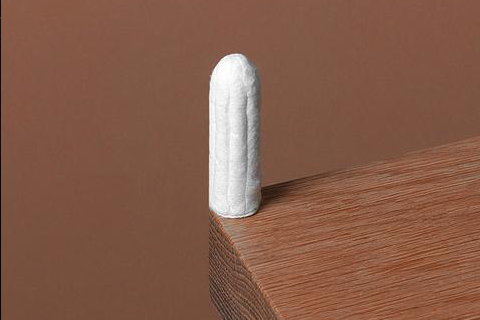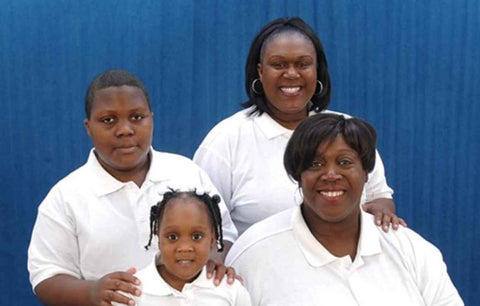28 Day News Cycle: What’s Going On In The World of Periods?
thinx archive
·5 min read

by Team Thinx | 09/14/2017
I would say there’s no better place to get all of the latest in period news and menstrual updates than the THINX Slack channel, but since you guys don’t have access to that (yet... let me see what I can do) — I’m giving you a rundown of what’s been happening in the world of periods.
Can you be fired for getting your period at work? (The ACLU says hellllll NO.)

Via the ACLU
Alisha Coleman was a 911 call operator (so, for real, a woman who knows how to handle an emergency) when she was fired in 2016 for failing to “practice high standards of personal hygiene” after experiencing two heavy menstrual flows in her office (a symptom of premenopause). Alisha sued her former employer, and after the case was dismissed earlier this year, the ACLU stepped in to assist her appeal. They argue that “being fired for unexpectedly getting your period at work is the very essence of sex discrimination.” As Alisha says herself: “Every woman dreads getting period symptoms when they’re not expecting them, but I never thought I could be fired for it. Getting fired for an accidental period leak was humiliating. I don’t want any woman to have to go through what I did, so I’m fighting back.” And Alisha, we’re right there with you!!
Federal prisons are now required to provide better access to pads and tampons

Adequate access to menstrual hygiene products in prisons across the United States has always been a major issue for women’s rights advocates. To recap, there is little consistency across the criminal justice system when it comes to menstrual hygiene. Some jails and prisons provide free pads for women, some don’t, and some only supply a limited number, or tampons/pads that are of poor quality. If a woman needs more than what the prisons has given her, she can buy more from the commissary only if she can afford it. It’s essential to the dignity of incarcerated women that they have access to adequate menstrual products.
That’s why we were so glad to see a memo issued by the Bureau of Prisons this past August that said that women in federal prisons would be provided with a range of menstrual products, including tampons and pads, *at no cost*. As WashPo points out, this clarifies a vague policy that has led to many women struggling with a short supply of substandard products month after month. NJ Senator Cory Booker has said he will monitor the enforcement of the memo — “A policy memo is just words on a piece of paper unless it’s properly enforced.” Watch this space.
Indian girl kills herself after period shaming by teacher

In southern India’s Tamil Nadu state, a 12-year-old girl took her own life after a teacher humiliated her for a period stain on her school uniform. In class, the girl had told her classmates she had blood on her clothes, and asked for help, but the teacher made her show the stain in class. Officials say that a girl left a note saying her teacher had “tortured” her. This is a tragedy that demonstrates the devastating impacts of the taboo that surrounds menstruation in India, where women on their periods are considered “unclean” and may not go to temple or eat certain foods. This girl’s suicide also demonstrates the need to break down the stigma around menstruation in schools, and provide students with adequate period management options. Teenage girls in India miss 5 days of school a month because of their periods (59 days a year), and 23% of girls drop out of school after they start menstruating. Around 70% of women in India say their families can’t afford menstrual hygiene products.
If you or someone you know are having suicidal thoughts for any reason, you can contact the National Suicide Prevention Hotline at 1.800.273.8255. For a list of suicide prevention hotlines across the world, follow this link.
Nepal criminalizes “menstruation huts”

In July, we were saddened to hear the news from Nepal that 19-year-old Tulasi Shahi had died from a snake bite while banished to a cowshed — part of a common ritual in Nepal called chhaupadi where women, considered unclean during their periods, are separated from their families and made to sleep alone. In May, 14-year-old Lalsara Bika died from an illness she contracted during her isolation in a menstrual hut. Chhaupadi was outlawed by the Nepalese Supreme Court in 2005, and the government has released guidelines to help eradicate it, but the lack of punishment for those responsible and the depth of the taboo around menstruation means that little change had been seen by activists. In August, Nepal’s Parliament passed a bill that criminalizes the banishment of women to menstrual huts — anyone forcing women into the huts will be sentenced to three months in prison, or fined $US30.
Advocates believe that the challenge will come in enforcing this new law: "Yes, criminalizing it validates the fact that the government of Nepal thinks it is a criminal offense, but it does not in any way ensure that people will stop doing it," says Pema Lakhi of the Nepal Fertility Care Center, one of the country's leading menstrual hygiene activists.
New guidelines in the UK advise doctors to listen to women (...I know, I can’t either)

^^ Ideally not your doctor trying to talk to you about your endometriosis
Endometriosis is a crippling and painful disease, affecting an estimated 176 million women worldwide. Yet, it can take, on average, 7, 8, or even 11 years to diagnose. Many women are told their pain is normal, are told they are overreacting, misdiagnosed, and, in turn, endure years of pain and mistreatment. New guidelines released this week from the National Institute for Health and Care Excellence (NICE) in England suggest trying something new: listening to women when they say they have severe period pain, pelvic pain, or pain during sex.
I know, super groundbreaking stuff, but maybe, just maybe, women might actually be capable of knowing what’s going on in their own bodies after all!!!
“Delayed diagnosis is a significant problem for many women with endometriosis leading them to years of unnecessary distress and suffering,” said Professor Mark Baker, Director of the Centre for Guidelines at NICE.
Well, I guess thanks NICE! I wish we didn’t have to have guidelines to tell our doctors to listen to women who are in pain but here we are.
That’s all from us. It’s clear there’s still a lot of work to do breaking down the harmful stigma that surrounds menstruation, both in the US and around the world. But that’s why we’re all here, right? See you next cycle!
by Team Thinx


